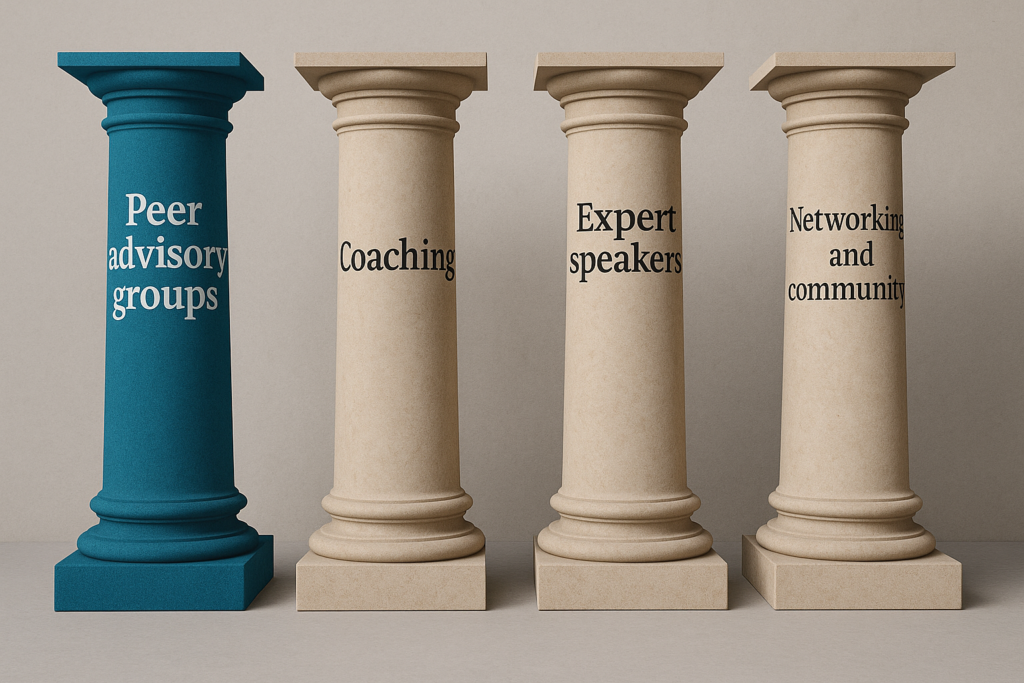As the head of your organization, who helps you think through the most important decisions you make?
Running an organization can be exhilarating and isolating. The bigger the stakes, the fewer people you can really talk to. Employees expect confidence. Investors want certainty. Customers need reassurance.
Yet every leader faces moments of doubt, when the path forward isn’t clear.
That’s why the TEC experience is built on four powerful pillars: peer advisory groups, individual coaching, expert speakers, and a global network
of business leaders. Together, these elements create a system of support, challenge, and growth that helps leaders perform at their best.
This article focuses on the first pillar, the peer advisory group itself, where leaders come together in a confidential setting to help one another make better decisions, gain fresh perspectives, and strengthen their organizations.
That’s where the power of a peer advisory group comes in.
The Power of Shared Perspective
In a TEC Canada group, leaders from non-competing industries gather regularly to help each other see what they can’t see alone. They bring their real issues, the ones that keep them awake at night, and gain insight from peers who have faced similar challenges in different contexts.
It’s not theory. It’s not a seminar. It’s real-world problem solving with people who understand what it means to be accountable for results, people, and purpose.
A Real-World Example
(The following is a fictional case created for demonstration purposes.)
A few months ago, one of our members, let’s call her Sophie, brought an issue to her peer group. Her company had grown quickly, and one of her longest-serving team members was struggling to keep up with the demands of a new, more complex role.
Sophie’s initial question to the group was simple:
“How can I coach and train this person so they can be more successful?”
During the proprietary TEC process, members listened carefully, asked questions, and then helped Sophie uncover the real issue beneath the surface. It wasn’t about how to develop the person. It was about fit to role, ensuring that the right level of complexity of work was being done by someone with the capability to handle it.
Once Sophie saw it that way, everything shifted. The problem wasn’t a lack of effort or loyalty. It was a mismatch between the role’s increasing complexity and the individual’s current capacity.
By reframing the issue, Sophie was able to make a clear, fair, and confident decision. She restructured the role and decided to hire externally for the position. Within weeks, the new hire was operating at the right level, taking on the full scope of accountability that the role required. The transition was challenging but smooth, and productivity improved almost immediately.
The best part? Sophie’s long-time team member found a better-fit opportunity in another company, where their skills and experience were exactly what was needed.
By changing the way she framed the problem, Sophie turned a painful dilemma into a win-win outcome for herself, her organization, and her employee.
Decisions Don’t Get Easier. You Get Better.
Leadership doesn’t simplify with experience. The challenges evolve. The consequences grow.
The best leaders aren’t the ones who have all the answers. They’re the ones who keep asking better questions and who surround themselves with people who will ask them too.
In a TEC group, every conversation is grounded in trust, accountability, and the belief that we can achieve more together than we ever could alone.
Learn More
As a TEC Chair, I would be delighted to explore your fit with TEC and help you find the peer group that’s right for you – whether that’s my group or another across the TEC Canada network. Please feel free to reach out.
Learn more about TEC Canada and all the options for peer groups. If you are the head of the organization, a key executive, or an advancing leader, there is an option for you.







